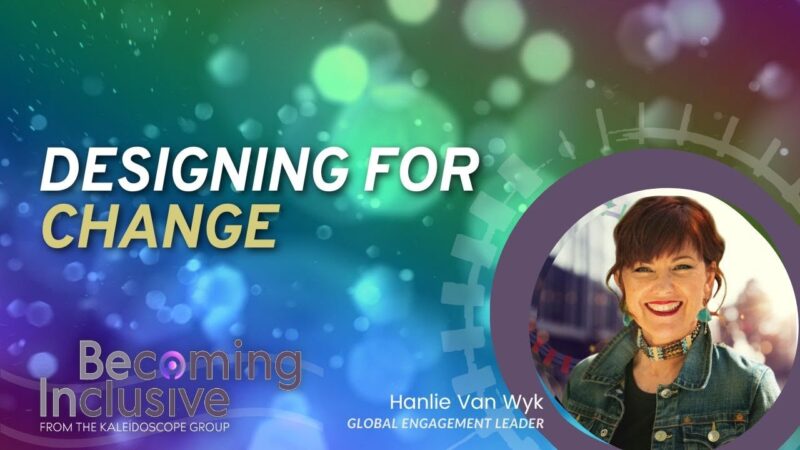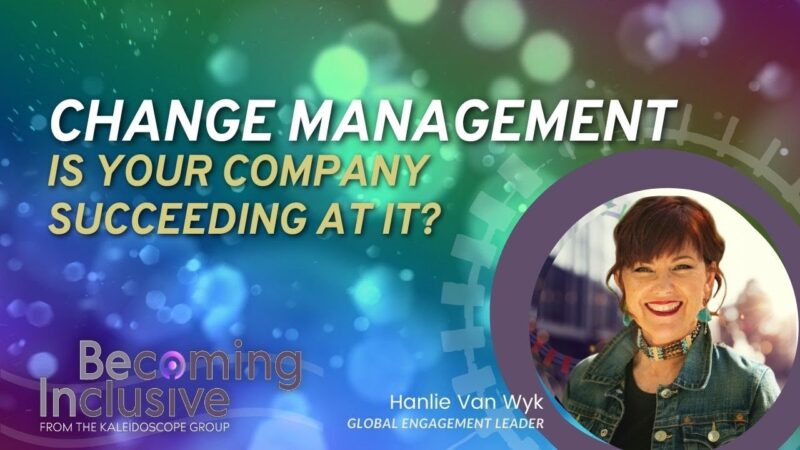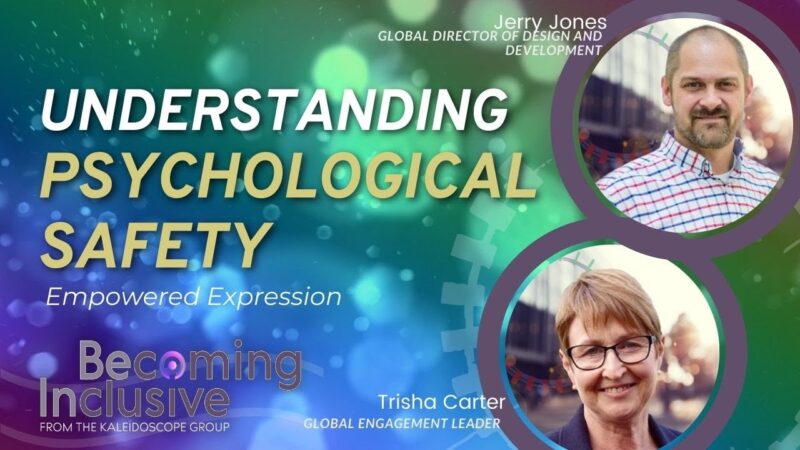Why Inclusion Isn’t Enough
December 17, 2021
Audio Format
Would you rather to read through what’s said?
This is Becoming Inclusive from The Kaleidoscope Group, where we’re thinking differently about diversity, equity, and inclusion. For more empowered people at work. We’re committed to real change and that begins with real conversations. Welcome in.
This conversation has been lightly edited for clarity.
Reggie Ponder
I’m Reggie ponder and welcome to another episode of Becoming Inclusive. I have with me Margarita De Leon, Vice President of Client Services of The Kaleidoscope Group. And I’m always happy to talk to you Margarita. I just want to firstly just say welcome. And the topic that we’re going to talk about today is why inclusion is not enough. Chris Georgas actually did the first podcast, which was about why diversity is not enough. So in talking about this, can you tell me what does inclusion look like in your estimation?
Margarita De Leon
Reggie, first of all, thank you for having me and inviting me to this podcast, I always love talking to you. So inclusion, what does that look like to me? I can tell you how I experience inclusion. When I am feeling included. I feel like my voice matters. I feel like the ideas, I share matter. I feel like I belong. And I feel like I’m in an affirming space that I show up. I can be myself. And it just feels right. So that’s what inclusion means for me, Reggie.
Reggie Ponder
I want to I want to dig into that a little bit. Because some people believe that folks have thin skin, that you come into work and you say, “Well, I feel included, I pay you to come and give me your ideas to to get in there and get the work done. Get your hands dirty.” And you’re telling me I don’t feel included, it seems like your your your skin is a little thin.
Margarita De Leon
Yeah, that’s such a great observation. But here are some thoughts. You know, our workplace is almost like a second home. And yes, you might be paying me to do this work. But why not, in that space of doing our work, is it a place where I feel valued? Because if I if I’m going to a workplace where I’m feeling valued and included, I’m going to give you 100%, 200%, I want to show up, I want to be part of what you’re putting out. But if I’m going to a place where it’s, “You’re getting paid just show up,” there’s plenty of other places I can go.And so for me, I think it’s important to have a workplace that again, I like to use the word is self affirming, that allows me to be me, because I know when I’m myself, I can do my best work. And that’s why I think it’s important.
Reggie Ponder
There’s this whole discussion about bringing your whole self to work, meaning all the things that come with you. But that also means bringing the outside pressures and the things that are happening in the world to work. And some people believe that that’s actually counterproductive. Why do we have to talk about all the other things that are included in your life?
Margarita De Leon
Welcome to the 21st century Reggie. Of course, we’ve got to talk about those other things. We are not just one part of ourselves, right? This is all of it. And all of it is: You know what, my grandson was up really late last night. I’m tired today. But I want to show up for work. I want to get my work done. You know what, I had a doctor’s appointment didn’t go that well. And I’m feeling kind of down. But I have to come to work because I have an assignment I want to complete. I don’t think it’s realistic anymore. To stay with the old mindset and the old mindset was, leave yourself leave all your personal stuff at home. And then just come to work and be this cleaned up version of yourself. That’s just not happening anymore. The world has opened up. People are bringing their whole selves to work. And I believe that good managers and good leaders know how to manage that and know how to use their empathy muscle to address those things. And when you can look at me and say, “Margarita, I’m really sorry that you didn’t get enough rest and you know, take a nap if you need it.” You’re waking me up. I don’t need a nap. Because you know what, you made me feel good about myself. So I’m coming to work, I’m gonna do my thing for you. So, welcome to the 21st century.
Reggie Ponder
So to you, that’s part of inclusion, really being able to bring all the different aspects that you have at work, and if there’s some issues or problems, then hopefully your place of employment is accommodating. Isn’t it difficult though? Because everybody has an issue. I need childcare over here. I had a death over here. I slipped and fell, and have to get some operation on my arm. So if leaders cater to all these things, they’re not going to have any workers!
Margarita De Leon
Reggie, you’ve said it, everybody has something going on. And when we recognize that, then we’re recognizing the humanity and each of us as people. And so it’s not a matter of, “okay, we got to stop everything. Because this happened here today, this happened there.” But if I couldn’t get to my work this morning, it’s something I’m going to try and get to it this evening. Because you valued me, you appreciated me, you realized I was going through a rough time. This is the era that we’re in, and it’s not about stopping everything. It’s recognizing that everybody has something, and we need to be kind. And we need to use our empathy muscle, so that we can help others be their best selves in the workplace.
Reggie Ponder
I love that Margarita. I love the fact that you’re saying – pay attention to the fact that everyone has something. It means that you really do show that you value people, and that value translates to a loyalty, or a commitment that says, I will use my discretionary time to do this work, as opposed to you don’t value me. so I’m not using my discretionary time. It’s five o’clock and it’s time to go.
So now that we’ve kind of defined inclusion, and it, well, includes a lot of things. So why isn’t inclusion enough? Chris Georgas talked about why diversity is not enough. And now we’ve got the word, inclusion. And in the future, we’ll talk about the word equity. It seems like nothing is enough. As a manager, I just want to know, what do I do? Am I doing diversity? Am I doing inclusion?
Margarita De Leon
Why isn’t inclusion enough? For me, inclusion is present day. How am I feeling valued and included today, so that I can bring my best work to the table. But let’s talk about diversity. In an organization, if you don’t have diversity, you’re missing two big pieces. First, diversity inspires the mind. When I’m around a lot of different thinkers and different ways of doing things, it’s very inspirational. I want to be around diversity. You hear young people say that all the time. They want to be around, they want to work for organizations that are diverse, because it’s fun to learn and to be inspired. The other thing that diversity does is it feeds your soul. And that’s about people sharing their lived experiences. And when we begin to understand and appreciate that everyone has their story, then that really enhances the heart of the organization. So you can make me feel valued and included, but if you don’t have diversity, then you’re missing those other pieces that inspire the mind. They go hand in hand.
Reggie Ponder
I want to I want to press this though. This whole thing of “feeding the soul” because it sounds good. But what do you mean it feeds the soul? I’m trying to run a business here!
Margarita De Leon
What I mean is that when you begin to embrace diversity, what you’re embracing is people, and the fact that people come from different backgrounds. And when you can go to the next level, have those conversations: Tell me about yourself, tell me why you’re different. Tell me what shaped you. If you’re in those conversations, you are going to feel it, not only understand it and unpack it, but you’re going to feel it. And that’s a whole different space to be in.
Reggie Ponder
Margarita,I know that you’re Puerto Rican. Right?
Margarita De Leon
I’m Puerto Rican!
Reggie Ponder
And you are you proud about that. But what does that have to do with making these widgets that I need you to make here at the office?
Margarita De Leon
It’s not just me being Puerto Rican. I think when we talk about diversity in organizations, we talk about that which we do not have. What am I missing? If I have the same people doing the same thing for a long time, and spitting out the same product, where’s my innovation? Where’s my new thinking? Where’s my way of doing things differently? Bringing in people who have different lived experiences, different roles, different work experiences, that are going to help break some of that open. As a Puerto Rican I might bring some things to the conversation that people haven’t thought about. And it’s our willingness to really hear and listen to what other people bring that’s going to help change things up.
Reggie Ponder
What’s another reason why inclusion is not enough?
Margarita De Leon
When we talk about inclusion, we have to think about the individual. And so if we have blanket inclusion such as, we’re all going to go out for a picnic on such and such date as such, in such park to recognize all the employees, or we’re all going to have a virtual get-together. And we’re going to talk about who did what good, we’re going to give some virtual kudos. That might be okay for you. But that’s not okay for me. So we get into this discussion about equity, another piece of that pie, that when we begin to understand what being fair is, it’s really about what you need to help you succeed versus what I need. And the reason we talk about equity is because your background and upbringing are very different from mine. And you have some unearned advantages in your life that I didn’t have. And I have some, they have some, they have some over there, and when we start to unpack that and realize it, what you need to be successful and feel valued is going to be very different from the next person. Everybody does want kind of like this cookie cutter formula for how do I make everybody happy? Newsflash: It’s not as simple as that. It’s about the relationships that we build individually with people so that we can honor and give them what they need. And that’s what inclusion is about.
Reggie Ponder
You made me think of this the famous painting where the kids are looking over the baseball field. And one little kid is really short so that kid is on on a box. That makes them the same size of the kid who’s maybe a little bit taller, and then the tallest kid sees over the fence as well. That’s that cookie cutter approach that you’re talking about, but you’re saying something different about equity in a very strong way.
Margarita De Leon
It’s really about the culture, that if I can look at myself and say, “Boy, I have all these privileges, I didn’t realize it, but so and so as a new immigrant coming into the organization, or as a female coming into the organization, or whatever it is, they’re having a different experience.” And I really have to think about what’s fair for them. And how do I treat them so that they’re feeling like they’re being treated fairly. People want want this to be simple, and it’s not.
Reggie Ponder
It’s who’s not in the room. If you look around and you say, we’re selling tampons, and there are no women. You also make me think of this whole issue of being sensitive to not having women for the sake of just having women. Is that tokenism?
Margarita De Leon
We talk about diversity, that we want that diverse representation because maybe we have never had it. Then you have organizations that haven’t even thought about it, and now they want to dig in and they’re excited. We’re going to do this, we’re going to get diverse representation, we’re going to put all these things in place, which isn’t easy, either. But it’s beyond just the representation. Once you get that representation, then how are diverse people helping to shape your profile of success.
Reggie Ponder
And that’s inclusion, right? What you’re saying is that – you get them in – diversity – but now what are they doing as part of the overall organization?
Margarita De Leon
Yes. And further, historically, even present day, the further up you go into the organization, the more white it is. And so what are we doing a when we bring people in that are considered outsiders? How do we make them feel valued and included? But how – and I can’t emphasize this enough – how are we having them help us shape our organization? For the future? Because we know what we look like in the past, but how do we get their voices, use their power in our existing power structure, and integrate that? So that they can start saying, “For people to be successful at this company, we’re going to shift this, we need to be talking about these things, and have their influence in what success looks like in a company.” It’s just beyond, okay, now I have women, and now I have men. Are you really listening to them? And how are you extracting what they see as success in an organization so that we can make that shift together? It’s not enough to just have representation. You’re right.
There is a real synergy that happens if you’re doing diversity, if you’re doing inclusion well, and if you’re doing equity, well. It’s a tripod. Three things work together, but they cover different aspects of helping to elevate an organization to another level. If you don’t have one without the other, it’s very difficult. They work hand in hand. You really have to take that step back, you really have to embrace it as a leader for the organization. You really have to define what it is for your organization, and you have to talk about it. And if you’re not doing all three things, it’s going to be very hard for you to transform the organization. So many organizations do it pieces. They get frustrated thinking, haven’t we done enough? Organizations are evolving and changing very rapidly. So these conversations have to be ongoing. If you’re not having ongoing conversation about this, you cannot reap the benefit, and you cannot reap the impact. Inclusion is not enough, you need all three to create that synergy to really make the difference.
Reggie Ponder
What do you see companies doing today as it relates to inclusion?
Margarita De Leon
I’ll just give an example. I’ve been working with the CEO of a construction company. This CEO is the sponsor of an ERG (Employee Resource Group) called Women Breaking Ground. He is really providing the resources. He’s providing the planning, he’s providing whatever the women need, because he knows that women are underrepresented in construction. He has put together a multi-pronged strategy and really investing personal time and energy because he wants women to succeed. That is powerful, because women in construction have been historically outsiders, and he is amplifying and elevating women in a way that only a CEO could do. That to me is a great example of inclusion.


